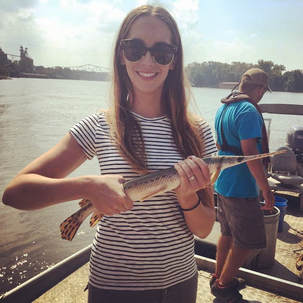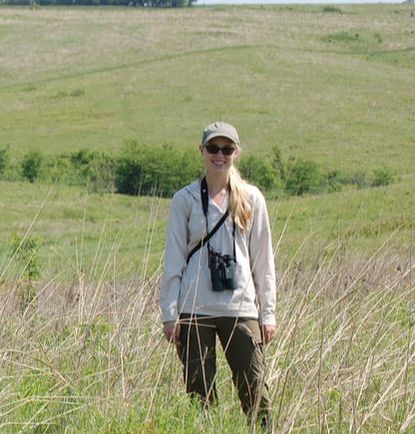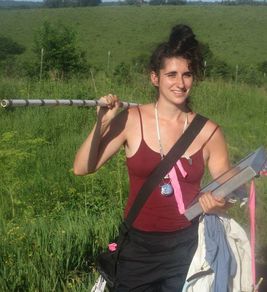 Why did you choose to become a scientist? I first became interested in biology in middle school, which is when I started keeping aquariums and breeding fish. At that age, I had no idea that people conducted research as a profession. Instead, I imagined myself becoming a veterinarian, or maybe being an animal caretaker at a zoo or an aquarium. My career plans changed after I participated in the honors programs as an undergraduate at Northern Illinois University. A requirement of the honors program was to complete a research project, which led me to join an aquatic ecology laboratory. Through my undergraduate research experience, I discovered that liked the problem-solving aspect of research, and found the process of conducting science rewarding. I decided that I wanted to continue on a research career path. I ended up staying at Northern Illinois University to complete my Master’s degree, which focused on sexual selection and social learning in two species of darters (a diverse group of small stream fish). I am now in the 5th year of my PhD at the University of Illinois at Urbana-Champaign, where I have continued to study darters. What are your current research interests? My research uses behavioral and genomic approaches to investigate sexual selection and speciation in fishes. Specifically, I am interested in how the outcome of reproductive interactions (i.e., mating and competing over mates) between species influences speciation. If interspecific reproductive interactions are maladaptive (e.g., if hybrids suffer reduced survival compared to purebred individuals), this can select for divergence in reproductive traits between species in areas where they co-occur. This leads to a pattern of reproductive character displacement, where species exhibit enhanced bias against mating/fighting with members of another species in populations where they are sympatric compared to allopatric with respect to one another. I study how reproductive character displacement promotes sympatric and allopatric speciation in darters, which are one of the most diverse groups of North American stream fishes. Choose one quality that you think is the most important for making a good scientist. Why? Being able to manage your time and having a healthy work-life balance is crucial. There will be periods of time when you need to log long hours in the field or lab collecting data, or in the office writing a manuscript or grant, but it is easy to get burnt out if that is your schedule 100% of the time. It is important that you take time for yourself, which will ultimately make your career more productive and enjoyable. What advice would you have for aspiring scientists? As an undergraduate, try to participate in research in a few different laboratories if you can. This will give you an idea of which types of questions interest you (and which don’t). Getting any experience in a lab as an undergraduate will help you to decide if research is something you want to pursue as a career. Why 500 women scientists? I support 500 Women Scientists’ mission of increasing inclusivity in science, providing a supportive community for women in science, and increasing public understanding of science.
0 Comments
 Why did you choose to become a scientist? I can't remember not wanting to be a scientist. I've been collecting bugs and gathering specimens from the field by my house since before I can remember. I enjoy spending time outside, thinking deeply about ideas, and helping wildlife, all of which makes this career a perfect fit for me. What are your current research interests? I'm currently focusing on how lands used to produce cattle can also benefit grassland birds and arthropods. Grasslands that support cattle often have been planted with invasive grasses, and I'm focused on one particular invasive grass called tall fescue. Tall fescue is highly valued because it can help control soil erosion and can survive droughts, but it also can make cattle lose weight and potentially causes problems for birds and arthropods. So, I'm exploring how birds and arthropods respond to tall fescue management, but I’m also exploring how willing landowners are to implement this management. I think it’s critical that scientists, especially environmental scientists, don’t neglect the human dimensions of their research. Choose one quality that you think is the most important for making a good scientist. Why? Curiosity. Being excited about the process of exploration makes all the mundane tasks more than worth it. What advice would you have for aspiring scientists? Collaborate with your peers and your students. Collaboration not only has the potential to increase the number of manuscripts you have, but it also can challenge your viewpoints, change your perspective, force you to defend your science, and its fun! Why 500 women scientists? Whether we like it or not, science is political. Existing as a woman in science has taught me that. Not only can we influence policy, but scientists are also humans that interact with policy. And these humans include immigrants, people of color, LGBT folks, and more groups who are disproportionately affected by systemic oppression. If scientists ignore these issues, we become complicit in this oppression. Thus, I want to learn how to make science more inclusive and welcoming for all these groups. In particular, I'm currently interested in learning how to make science more welcoming to trans people, who are not often a part of our 'diversity' conversations.  I'm a 2nd year Master's student in the Natural Resources and Environmental Science department at UIUC. My program focuses on applied ecology. We try to identify patterns in nature so that we can use this information to inform conservation practices and management decisions. We often explore patterns before and after a management action is preformed so that we can monitor how the populations of interest responded to the treatment. Why did you choose to become a scientist? I want to intervene on behalf of at-risk plants, animals, and ecosystems to help them survive. Since a young age, I was always disturbed at the wave of extinction of wildlife and the destruction of habitat all over the world, on land and underwater. After I graduated from college, I started working at the Wild Bird Fund, New York City's only wildlife rehabilitation center. My work at the Wild Bird Fund was truly formative, and after working there I came to value birds on a personal level. Therefore I want my career to focus on improving bird species' conservation outcomes and increasing our knowledge about birds and their habitats. What are your current research interests? I research how grassland and shrubland bird populations respond to conservation actions, specifically prescribed burns and cattle grazing, by tracking how bird species' abundances respond (e.g. increase or decrease) to these practices. I also study how prescribed fire and grazing change the larger ecosystem by measuring differences in the vegetation and the fire intensity during the prescribed burns. Broadly, I'm hyper-passionate about bird conservation. I'm also intrigued by an "ecosystem approach" to ecology, where we consider how the entire ecosystem functions so that we can conserve, maintain, or restore ecosystem processes, instead of focusing on species alone. Choose one quality that you think is the most important for making a good scientist. Why? Passion! I think it's important to be passionate about your science projects, because it's important to be driven and self-motivated when conducting your research. Research is a long-game. It takes several years to design, conduct, analyze, and publish. There are limitless knowledge gaps you could contribute to, so take some time to identify your passions and go for it. What advice would you have for aspiring scientists? Don't take everyone too seriously. The field can feel competitive at times, but don't dwell on it. Focus on your own work and stay confident in yourself. Why 500 women scientists? I've joined 500 Women Scientists because there's a history of hundreds of years obstructing women from pursuing science. I think the best way to overcome these barriers is to organize, support each other, and resist. |
AuthorWrite something about yourself. No need to be fancy, just an overview. Archives
March 2018
Categories |
 RSS Feed
RSS Feed
